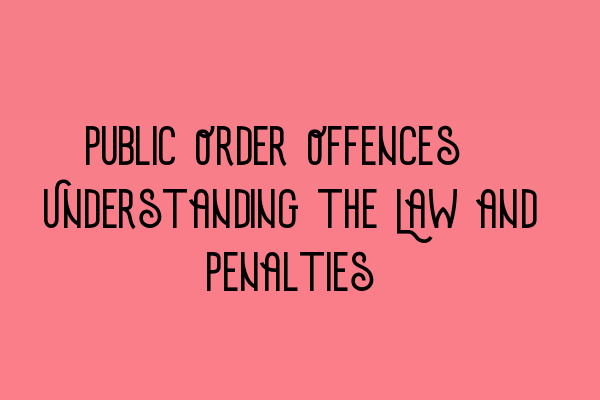Public Order Offences: Understanding the Law and Penalties
At SQE Criminal Law & Practice Law UK, we understand the importance of a comprehensive understanding of public order offences. Whether you’re studying for the SQE exams or simply interested in expanding your knowledge, this blog post will provide valuable insights into the law and penalties surrounding public order offences.
What are Public Order Offences?
Public order offences are criminal acts that involve disorderly conduct or causing a disturbance in public places. These offences aim to maintain peace and protect public safety, as well as ensure the smooth functioning of society. Common examples of public order offences include:
- Disorderly conduct
- Public drunkenness
- Harassment
- Threatening behavior
- Violent conduct
If you’re preparing for the SQE exams, it’s crucial to have a solid understanding of public order offences, as they are likely to be covered in the criminal law and practice module. To enhance your preparation, we recommend practicing SQE 1 exam questions and taking SQE 1 preparation courses.
Legal Framework and Penalties
Public order offences are governed by various legislations, depending on the jurisdiction. In the UK, the Public Order Act 1986 is the primary legislation that deals with these offences. It outlines the specific actions and behaviors that constitute public order offences, as well as the penalties associated with them.
The penalties for public order offences can vary depending on the severity of the offense. In less serious cases, individuals may receive a fine or a community order. However, in more serious cases involving violence or public unrest, individuals can face imprisonment.
It is crucial for legal professionals and aspiring solicitors to stay updated on the latest legislation, case law, and sentencing guidelines related to public order offences. Our SQE 2 preparation courses offer comprehensive coverage of the relevant laws and regulations, helping you develop a solid foundation of knowledge.
Defending Against Public Order Offences
If you find yourself or your client facing charges related to public order offences, it is essential to understand the available defenses. Common defenses include:
- Self-defense
- Mistaken identity
- Lack of intent
- Mental health issues
It’s important to consult with an experienced criminal defense solicitor who specializes in public order offences. They can provide expert legal advice and build a strong defense strategy tailored to your specific case.
Stay Informed and Prepared with SQE Criminal Law & Practice Law UK
As a leading provider of SQE exam preparation resources, we offer a range of materials and courses to help you succeed in your legal career. From SQE 1 practice mocks to SQE 1 and SQE 2 preparation courses, we have everything you need to stay informed and prepared.
If you’re interested in learning more about the SQE exam dates or accessing valuable resources for your SQE preparation, be sure to check out our related articles:
- SQE 1 Practice Exam Questions
- SQE 1 Practice Mocks FLK1 FLK2
- SQE 2 Preparation Courses
- SQE 1 Preparation Courses
- SRA SQE Exam Dates
Remember, understanding public order offences is essential for any aspiring solicitor or legal professional. Stay informed, stay prepared, and take advantage of the resources available at SQE Criminal Law & Practice Law UK.
